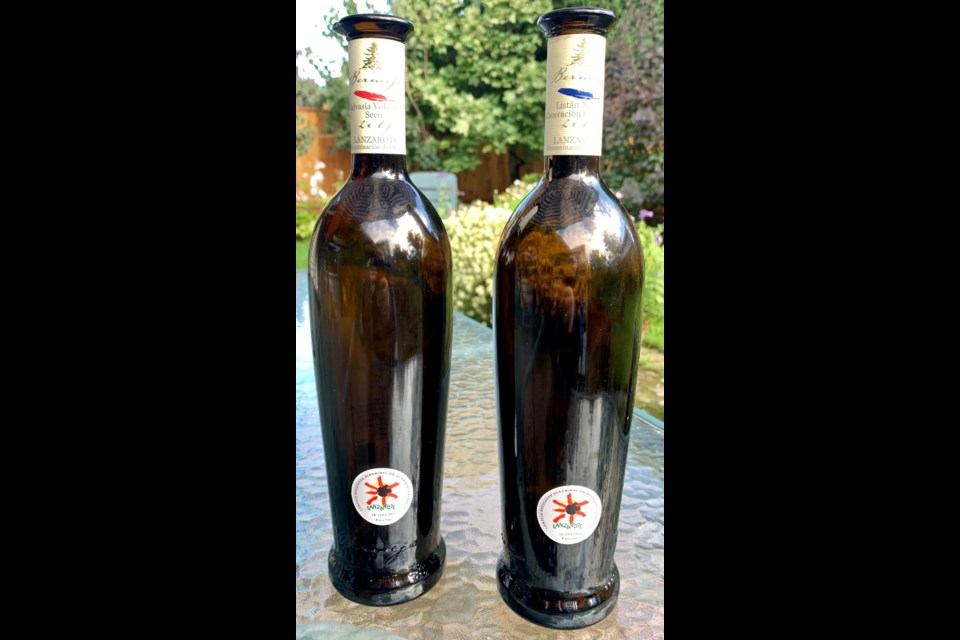Mother Nature has been cruel to Las Palma, the Canary Island with the destructive lava flows. But it can be very kind in other ways such as producing impressive wines.
Today I feature two unique wines from another Canary Island, Lanzarote whose wines are grown on ancient lava flows. There is nothing else like it in any vineyard on Earth. Stand in the vineyards on the island of Lanzarote and you will know how Neil Armstrong felt when he was the first human to set foot on the Moon.
A volcanic explosion from the 18th century covered the entire island in lava and ash 3-5 metres deep, making grape cultivation challenging. Each vine must be planted in a hole that breaks through that infertile volcanic crust of petrified lava to the organic matter that can nourish it.
And to complicate things, the wind is so ferocious that rock walls for protection surround each hole. Yields are miniscule because of the extreme conditions. But on the positive side, each grape of Malvasia is concentrated in flavour.
The Bermejo Lanzarote 2019 Malvasia Volcanica Seco [SKU 12135] ($35.99; “92 points”) comes in a unique bottle with a pour spout and the label on the neck. It’s a cross between Malvasia Aromatica and an indigenous Canary Island grape. This dry white displays a medium straw colour and an aroma revealing lemon zest, ripe pear and peach as well as minerals.
On the palate there’s a smorgasbord of honey-crisp apples with pears and peaches. Add to that some wet stone and ash as well as a savoury flavour. The Malvasia ends with a long finish of lemon and grapefruit with a touch of grapefruit pith bitterness and salinity.
Overall a very distinctive delicious white that is well balanced with appropriate acidity to encourage you to taste more. What to pair with the dry Malvasia?
Because the Canary Islands are part of Spain, serve tapas. Manchego cheese, grilled octopus, fried squid, jamón ibérico, salami, chorizo olives, or anchovies would be delightful!
Today’s second recommendation is Bermejo 2019 Lanzarote Listan Negro Maceracion Carbonica [SKU 12144] ($35.99; “ 93 points”). A special winemaking technique called carbonic maceration is applied to the grapes where the first fermentation is not caused by yeast but intracellulary inside the grape.
This method involves filling a sealed container with carbon dioxide and then adding whole bunches of grapes to the oxygen-free vessel. The berries use carbon dioxide to decompose the sugars and malic acid and produce alcohol.
Once the alcohol reaches two per cent, the berries burst to release the juice where normal yeast fermentation finishes the job. The resulting wine has low levels of acidity and tannins, and highly fruity aromatics.
With a dark burgundy colour, the Listan Negro Maceracion Carbonica has a gorgeous violet bouquet with red berries and nuts. It’s medium bodied with smooth silky tannins and cherry, strawberry, and raspberry flavours. There are almonds and minerality ending with a long fruity finish and a hint of baking spices.
Well balanced, and distinctive, the Listan pairs with tapas such as Pan con tomate, patatas bravas, pardon peppers, and Galician octopus that have tomatoes spicy peppers or paprika.
Both today’s Bermejo wines, the Lanzarote Malvasia Volcanica Seco and the Listan Negro Maceracion Carbonica are available in select BCL Stores.



